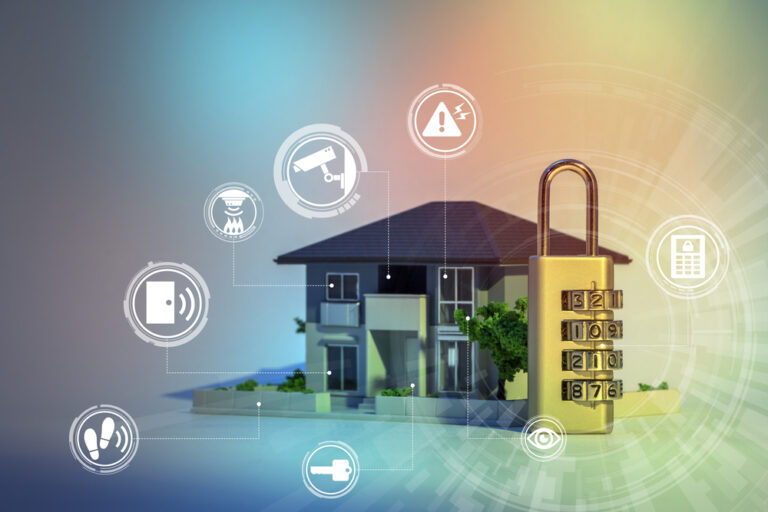
How to choose a home security system
Find out what to look for in a home security system that can offer you 24/7 peace of mind while protecting your family.
What type of home security system do you want?
In order to get the best home security system, it’s worth thinking about just exactly what it is you want to protect. There are different types of set-up. Including:
- Smart home security systems — smart home devices are increasingly popular and easily adjustable to your family’s preferences and schedules.
With smart home integration, you can control aspects of your security with third-party devices such as Amazon Alexa, Kwikset smart lock, Google Assistant & NEST and more. For example, you can ask Alexa to turn the lights on even if you aren’t at home. Often this is as easy as pressing a few buttons on a smartphone app. - Anti-burglar equipment — such as burglar alarms, outdoor cameras and glass break sensors if your main concern is with theft, vandalism or intrusion.
- Environmental monitoring services — this category includes smoke detectors, pipe freeze thermostats and other monitoring options. If your home is particularly old, you might want to consider devices in this category.
Once you’ve decided on the set-up you want, you can then get a home security company to analyse your home for vulnerabilities. For example, when we do this, as part of our survey we’ll give you a free quote, and give you some recommendations on the type of hardware that you’ll need.
Common home security system equipment.
Every home security provider will offer slightly different specialised tools and equipment. But there are some common security basics that they’ll all have.
Those include:
- Alarm systems — there are two types of home alarms. ‘Silent’ and ‘siren’ alarms. Contrary to popular belief, most types of alarm are silent. We are all familiar with siren alarms, which are good for scaring off intruders, and for emitting 110dB levels (the human pain threshold) in warning.
- Home security cameras — both indoor cameras and outdoor cameras can provide HD night vision, built-in floodlights and facial recognition, making them extremely effective deterrents.
- Video doorbells — A doorbell camera can help you to speak to whoever might be standing at the door while you’re away, and will notify you of any visitors.
- Motion sensors — (otherwise known as motion detectors) these sensors can detect movement inside the home at a prefigured radius.
- Door & window sensors — these entry sensors will alert you with notifications whenever they are opened.
- Control panels — a control panel represents the heart of your home security system and allows you to control your gadgets and to arm and disarm everything.
In addition to these common types of equipment, most companies will also be able to offer panic buttons, smart locks, carbon monoxide and smoke alarms, smart lights, key fobs, keypads and flood leak sensors to name a few more.
What to think about before committing to a home security system.
Here are a few things to ask yourself and any home security provider you’re thinking of partnering up with, including how to choose a security camera system for your home:
- Costs — carefully weigh the costs of the equipment, installation, activation and monitoring to see if it’s within your budget. You should also be weary of (and ask your home security provider about) any hidden fees or sneaky add-ons. Some companies might try to charge you an activation fee after installing your equipment, for example.
- Contract requirements — some systems might want you to sign up for long-term contracts (for example, up to three years). But some won’t offer you a contract at all, which can work out well if you don’t want to commit or plan on moving abroad.
- A self-monitoring or professional monitoring system — with professional monitoring, homeowners can rely on a team of experts (for a monthly fee) to keep an eye on your property and investigate any break-ins, issues or contact the emergency services on your behalf.
Good to know
If you choose to go with professional monitoring, there are three internet connection options you can choose to send information back to them: using a landline connection, broadband, or mobile.
Landline is the least expensive option, but it’s also the easiest for criminals to disable. Broadband is the second-best, but if the power goes out it will also fail. (Though you can keep the Wi-Fi going with spare backup batteries.)
Mobile monitoring works the best as it cannot be disabled easily. It operates via a built-in chip that will alert the professionals. However, it is the most expensive option.
- Wired or wireless security cameras — wired cameras are cheaper to install but are then fixed to whichever position they were installed in. (Which shouldn’t be a problem if the installation was carried out by a professional.)
However, many people like wireless home security systems and cameras as they have long battery lives and can be powered with either WiFi connectivity or mobile data. They can also be moved around at will. - The quality of your security cameras — scratching your head over how to choose a home security camera system? Not all cameras are created equal. The CCTV systems that we specialise in, for example, come complete with facial recognition, HD night vision, floodlights and more. They will offer a comprehensive deterrent plus identification of the intruders as they enter your property.
How the size of your home affects security.
Here we’ll broadly go over what you might need depending on the size and situation of your home:
- 1-bedroom flat — if it’s not on the ground floor, then a single motion sensor near the door might work well. Burglars don’t tend to target flats or apartments all that much when they’re not on the ground floor.
Ground floor flats on the other hand, are more than twice as likely to suffer a break-in. So you might want to purchase both an indoor camera and a motion sensor. - 2-bedroom house — we would recommend two entry sensors on the ground floor to cover the front and back, and a motion sensor for the downstairs corridor (if you have one) and the upstairs hallway. Two outdoor CCTV cameras, one for the front and back are also recommended.
- 3-bedroom house — if you have a 3-bed (or bigger), then unfortunately you’re in the most vulnerable property in the United Kingdom. Thieves love breaking into houses of this size. If you haven’t considered a professional outdoor CCTV setup or some kind of smart home automation, we would recommend it. All of these features should overlay what we’d recommend for the smaller property sizes described above.
The bigger your home — or the more valuables — the more robust we recommend your home security should be. A professional from a home security company should offer to come out and survey your property for free, to detect potential vulnerabilities, and to suggest what a good home security setup should look like.
DIY security systems or professional installation?
Some DIY home security systems are very easy to install even without professional help. However, we would strongly argue against self-installed systems in case the system isn’t set up or positioned effectively. Another drawback with these very easy-to-install systems is that they are easy to install for a reason: they are relatively simple and therefore, might not provide the security you’d like.
Instead, a professional can precisely determine the best way to place and install equipment for the highest functionality and protection. Installation also doesn’t cost a lot, often ranging from £[x] – [x]. So in our opinion it’s well worth the effort.
Good to know
If you have a small property that doesn’t have a lot of valuables, then DIY installations are probably more than adequate.
Choosing the right home security system provider.
If you’ve decided on a set-up that specifically deters burglars and a representative from a home security company has surveyed your home. Here’s how to know if they have your best interests at heart:
- Hardware — A good home security company will be able to tell you all about (and will be able to provide) the essentials that you will need for the set-up and will be able to build a custom package given your circumstances.
- Price — They won’t try to push any more than you’ll need, and should be able to provide a competitive price from an honest survey of your property.
- Reputation & customer experience — We’d always recommend seeing what their customers are saying about them online. (You can read our TrustPilot reviews here.)
Explore Access Security
Explore Premises Security
Contact Us
Company Name: Tel-Cam Security Systems Ltd
Company # 04066468
5 Broadway Buildings
Boston Road
Hanwell
London W7 3TT
© 2024 TELCAM Fire & Security Services | All rights reserved





